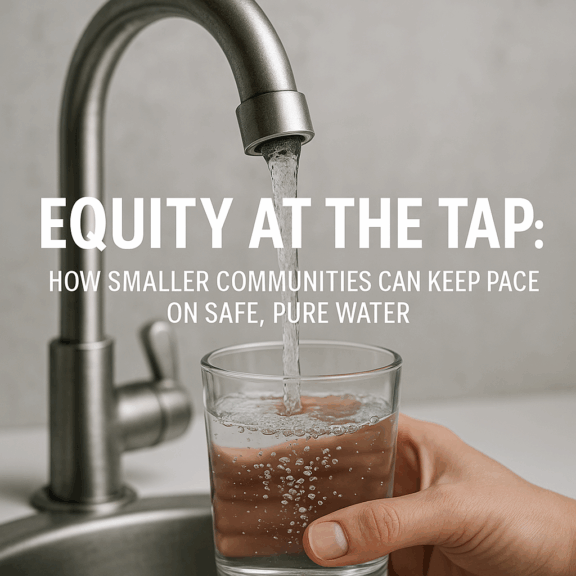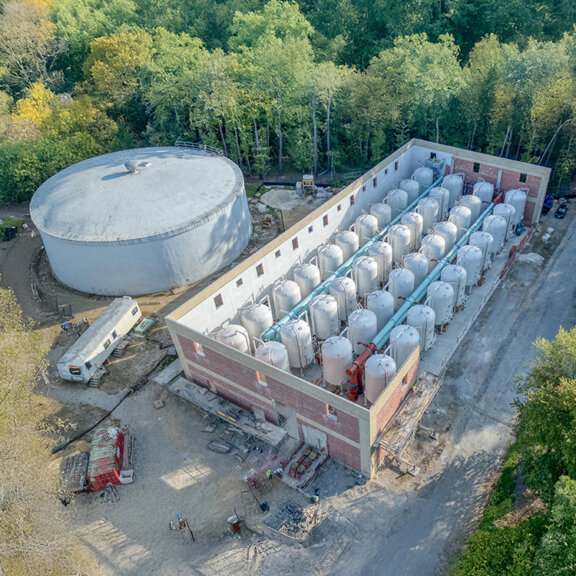Revitalizing Rural America: The Rise of Decentralized Wastewater Solutions for Sustainable Living
Written by: Nathan Smith, SVP, Marketing & Lifecycle Leader – Newterra
In the landscape of American infrastructure, rural communities often find themselves on the periphery, grappling with outdated or non-existent wastewater systems. The shift toward centralized treatment facilities in the past half-century, while beneficial for urban centers, has frequently overlooked these less populated areas, leaving them with a legacy of environmental and economic challenges. Yet, there is a growing recognition of the potential in decentralized wastewater systems, which promise a more sustainable and self-reliant future for these rural settings.
Decentralized systems, with their adaptability and smaller scale, offer a pragmatic solution that aligns with the realities of rural life. They represent more than just an alternative technical approach; they embody a shift towards empowering communities to manage their own resources more effectively. This move not only addresses the immediate need for reliable wastewater treatment but also echoes a broader theme of sustainable development, where environmental health and community well-being go hand in hand.
As we explore the journey of rural areas from infrastructural neglect to a future of autonomy and resilience, it becomes clear that decentralized wastewater treatment is not just a utility upgrade. It’s a step towards rectifying historical oversights and paving the way for a more balanced and equitable infrastructure development across the nation.
The Plight of Rural Infrastructure and Historical Context of Wastewater Treatment
The pivot to centralized wastewater treatment in the United States marks a significant chapter in the nation’s environmental policy, propelled by the Clean Water Act of 1972. This legislative milestone, aimed at reducing pollution and improving water quality, spurred the construction of large-scale treatment plants, centralizing waste management in urban centers. While these advancements heralded a new era of environmental responsibility, they inadvertently deepened the infrastructural divide between urban and rural America.
Rural areas, with their dispersed populations and limited financial resources, found themselves at a disadvantage. The economies of scale that made centralized systems viable in cities did not translate well to the countryside, where the cost and complexity of extending large sewer networks are prohibitively high. As a result, many rural communities continued to rely on outdated or inadequate systems, such as septic tanks and cesspools, which were often ill-equipped to meet the growing environmental and public health standards.
The implications of this centralization trend extended beyond mere infrastructure disparities. In many rural locales, the lack of modern wastewater treatment facilities has not only perpetuated environmental challenges but also stunted economic growth. Over 2 million Americans, predominantly in rural areas, live without proper wastewater infrastructure, a critical public health concern. This issue is prevalent in rural areas where poverty is often more common, and residents might rely on ineffective on-site treatment systems or practices like straight piping, which discharges untreated wastewater directly into the environment.
Poor wastewater management leads to water contamination, affecting agriculture, tourism, and overall quality of life. Additionally, the ongoing environmental neglect threatens the delicate balance of rural ecosystems, undermining long-term sustainability and resilience.
Thus, the historical shift towards centralized wastewater treatment, while successful in urban contexts, has underscored the need for a more inclusive approach to infrastructure planning. For rural America, the legacy of centralization is a complex web of challenges, weaving together issues of health, economy, and environmental stewardship. Recognizing these challenges is the first step in rethinking rural wastewater management, setting the stage for decentralized systems as a pathway to rectification and renewal.
Decentralized Wastewater Treatment: A Path to Autonomy
Decentralized wastewater treatment marks a paradigm shift, steering away from the uniform approach of centralization to embrace systems tailored to the distinct needs of rural landscapes. This evolution is characterized by localizing waste treatment, eliminating the extensive infrastructure typically associated with urban sewer networks, thus offering an economically and environmentally sound alternative for sparsely populated regions.
Central to this decentralized approach is the principle of local management and maintenance, aligning perfectly with the rural lifestyle. This method alleviates the logistical and financial strains associated with large-scale infrastructure projects, granting communities the power to control their environmental health. The progress in this field has been significant, with technologies like Membrane BioReactors (MBRs) leading the charge. These advanced systems are renowned for their high-quality treatment capabilities within a compact design, making them exceptionally suited for rural areas where space and resources are limited.
MBRs stand out as a substantial improvement on traditional septic systems, offering a level of treatment that produces effluent clean enough for reuse in agricultural irrigation or for replenishing local water bodies. The average cost of installing a septic system for a single household ranges from $10,000 to $30,000, underscoring the financial burden on rural households. Solutions, like MBRs, offer the benefits of community-based solutions without placing impossible burdens on individual families. This not only demonstrates the economic and technical superiority of these systems but also underscores their role in promoting sustainable water management practices within rural communities.
The benefits of decentralized wastewater systems extend beyond the practicalities of their installation and operation. They empower rural communities with the autonomy to manage their infrastructure, fostering enhanced stewardship of local water resources. This independence strengthens the bond between residents and their environment, encouraging practices that support sustainability and conservation. By adapting these advanced solutions to the specific needs and capabilities of each community, decentralized treatment effectively meets the unique challenges of rural areas, ensuring compliance with environmental and public health standards without compromising economic feasibility.
In essence, decentralized wastewater treatment directly supports the autonomy and long term survival of rural America, offering a sustainable pathway for infrastructure management that respects rural intricacies. It addresses the enduring challenges of environmental stewardship and community well-being, envisioning a future where rural areas can flourish with independence and sustainability.
Empowerment Through Independence and Autonomy
Empowerment in rural areas is intrinsically linked to the autonomy afforded by advanced decentralized wastewater systems. This independence in managing essential services like wastewater treatment catalyzes improved community decision-making and public health outcomes. When local stakeholders take the reins, they tailor solutions to their specific environmental and socioeconomic contexts, resulting in more effective and responsive management practices.
This localized approach to wastewater management does more than solve technical challenges; it fosters a sense of ownership and responsibility among community members. The direct involvement in the operational aspects of these systems leads to a better understanding of environmental stewardship, heightening collective awareness and action towards sustainable practices. As residents witness the tangible benefits of improved wastewater management — such as cleaner waterways, reduced disease prevalence, and enhanced environmental quality — their commitment to maintaining these systems intensifies.
Moreover, the autonomy associated with decentralized wastewater treatment has broader implications for community well-being and resilience. It equips rural communities with the tools and knowledge to respond proactively to environmental challenges, reducing dependency on external entities for infrastructural support. This self-sufficiency not only strengthens the social fabric of these communities but also enhances their capacity to withstand and adapt to ecological and economic fluctuations.
In essence, the move towards decentralized systems and the resultant autonomy it brings encapsulates a shift towards more empowered, informed, and resilient rural communities. This empowerment is a testament to the interconnectedness of local governance, environmental health, and community well-being, painting a future where rural areas are not just surviving but thriving, anchored by sustainable and autonomous infrastructure solutions.
Economic and Social Benefits
The economic and social benefits of decentralized wastewater treatment systems are multi-faceted, particularly in rural areas where they provide vital sanitation services. A study published in Scientific Reports highlighted that decentralized systems have significantly lower electricity consumption compared to centralized systems, with decentralized scenarios using only 0.363 kWh/m³ treated wastewater compared to the centralized treatment’s 0.873 kWh/m³. This efficiency translates into direct cost savings and reduced environmental impact, underscoring the economic advantage of decentralized approaches in areas where extending centralized infrastructure is not viable.
Indirect economic benefits of decentralized systems include local economic stimulation through job creation in system installation, maintenance, and operation. Moreover, improved sanitation facilities contribute to enhanced public health, reducing medical costs and increasing productivity by preventing waterborne diseases prevalent in areas with inadequate wastewater management.
Socially, the implementation of decentralized wastewater treatment improves the quality of life for rural residents. Access to reliable sanitation facilities enhances community well-being, supports sustainable development, and promotes environmental stewardship. Improved water quality from effective wastewater treatment not only benefits human health but also supports local agriculture and ecosystems, contributing to the overall resilience and sustainability of rural communities.
In summary, decentralized wastewater treatment systems offer significant economic and social benefits, particularly in rural areas. They provide a cost-effective and efficient solution to sanitation needs, stimulate local economies, improve public health, and enhance the quality of life, making them a valuable investment in the sustainable development of rural regions.
Future Prospects: Enhancing Rural Viability Through Investment, Awareness, and Policy
The future of enhancing rural viability through decentralized wastewater treatment in the United States intertwines increased investment, awareness, and robust policy frameworks. The EPA and USDA’s “Closing America’s Wastewater Access Gap Community Initiative” targets underserved communities, aiming to provide sanitation services in rural areas. This initiative reflects the national effort to bridge the infrastructure gap in these communities.
At the state level, states like Texas and Florida have taken proactive approaches in transitioning from septic to sewer systems, showcasing significant legislative and financial commitments to improve water infrastructure and manage water resources sustainably.
In Texas, the legislative action through Senate Bill 28 allocated $1 billion for water infrastructure upgrades, including septic-to-sewer projects, aiming to address water scarcity and support a growing population. This initiative is part of a larger strategy to utilize state surplus funds to match federal investments, thereby expanding resources for comprehensive water management solutions.
Florida’s focused efforts in regions like Lee County, where the state Wastewater Grant Program funded septic-to-sewer conversions, highlight the targeted approach to reduce nutrient pollution and improve waterway health. These projects, part of a $240 million initiative, demonstrate the state’s commitment to environmental sustainability and public health.
These state-level actions, supported by federal programs like the Clean Water State Revolving Fund, provide low-interest financing for water quality projects, enabling the implementation of advanced decentralized systems like Membrane BioReactors (MBRs). These systems are not only cost-effective and environmentally sustainable but also crucial for rural areas where traditional centralized treatment is unfeasible.
Raising awareness and educating communities on the benefits and operations of decentralized systems is vital. The EPA’s Decentralized Wastewater Management MOU Partnership emphasizes improving decentralized system management through collaboration, public education, and information exchange, underscoring the importance of community engagement in sustainable wastewater management.
Policy advancements are essential to encourage the adoption of decentralized systems. Legislative support at both state and federal levels is needed to integrate these systems into rural infrastructure planning effectively. Policies that promote the use of advanced decentralized systems, streamline approval processes, and provide clear implementation guidelines are crucial for enhancing their uptake.
In conclusion, enhancing rural viability through decentralized wastewater treatment hinges on strategic investment, comprehensive awareness campaigns, and supportive policy frameworks. By leveraging examples from states like Texas and Florida and focusing on these key areas, stakeholders can ensure that rural communities have access to sustainable, efficient, and cost-effective wastewater management solutions.
Conclusion
As we contemplate the journey of decentralized wastewater treatment, its transformative potential for rural communities becomes undeniably clear. This approach not only champions the ethos of independence and autonomy but also significantly enhances the quality of life through sustainable infrastructure development. Decentralized systems, tailored to the specific needs and constraints of rural areas, embody a future where communities can manage their resources efficiently, fostering environmental stewardship and resilience.
We invite others to delve deeper into this critical discourse. Share your insights, experiences, and questions through our web forms or join the conversation on our LinkedIn platform. Your perspectives enrich the dialogue, helping to shape a more nuanced understanding of decentralized wastewater treatment’s role in rural sustainability.
For those seeking to explore further, Newterra.com offers a wealth of resources. Downloadable materials are available to provide additional value, supporting an informed and engaged approach to wastewater management in rural settings.
In closing, the path to a sustainable and empowered rural future is paved with knowledge, collaboration, and innovative solutions like decentralized wastewater treatment. Together, we can help shape a more resilient and autonomous rural landscape.


